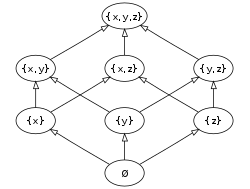| This article includes a list of general references, but it lacks sufficient corresponding inline citations. Please help to improve this article by introducing more precise citations. (May 2020) (Learn how and when to remove this message) |

In mathematics, the axiom of power set is one of the Zermelo–Fraenkel axioms of axiomatic set theory. It guarantees for every set the existence of a set , the power set of , consisting precisely of the subsets of . By the axiom of extensionality, the set is unique.
The axiom of power set appears in most axiomatizations of set theory. It is generally considered uncontroversial, although constructive set theory prefers a weaker version to resolve concerns about predicativity.
Formal statement
The subset relation is not a primitive notion in formal set theory and is not used in the formal language of the Zermelo–Fraenkel axioms. Rather, the subset relation is defined in terms of set membership, . Given this, in the formal language of the Zermelo–Fraenkel axioms, the axiom of power set reads:
where y is the power set of x, z is any element of y, w is any member of z.
In English, this says:
- Given any set x, there is a set y such that, given any set z, this set z is a member of y if and only if every element of z is also an element of x.
Consequences
The power set axiom allows a simple definition of the Cartesian product of two sets and :
Notice that
and, for example, considering a model using the Kuratowski ordered pair,
and thus the Cartesian product is a set since
One may define the Cartesian product of any finite collection of sets recursively:
The existence of the Cartesian product can be proved without using the power set axiom, as in the case of the Kripke–Platek set theory.
Limitations
The power set axiom does not specify what subsets of a set exist, only that there is a set containing all those that do. Not all conceivable subsets are guaranteed to exist. In particular, the power set of an infinite set would contain only "constructible sets" if the universe is the constructible universe but in other models of ZF set theory could contain sets that are not constructible.
References
- "Axiom of power set | set theory | Britannica". www.britannica.com. Retrieved 2023-08-06.
- Devlin, Keith (1984). Constructibility. Berlin: Springer-Verlag. pp. 56–57. ISBN 3-540-13258-9. Retrieved 8 January 2023.
- Paul Halmos, Naive set theory. Princeton, NJ: D. Van Nostrand Company, 1960. Reprinted by Springer-Verlag, New York, 1974. ISBN 0-387-90092-6 (Springer-Verlag edition).
- Jech, Thomas, 2003. Set Theory: The Third Millennium Edition, Revised and Expanded. Springer. ISBN 3-540-44085-2.
- Kunen, Kenneth, 1980. Set Theory: An Introduction to Independence Proofs. Elsevier. ISBN 0-444-86839-9.
This article incorporates material from Axiom of power set on PlanetMath, which is licensed under the Creative Commons Attribution/Share-Alike License.
| Set theory | ||
|---|---|---|
| Overview |  | |
| Axioms | ||
| Operations |
| |
| ||
| Set types | ||
| Theories | ||
| ||
| Set theorists | ||
 the existence of a set
the existence of a set  , the
, the  is not a
is not a  . Given this, in the
. Given this, in the 
 and
and  :
:





